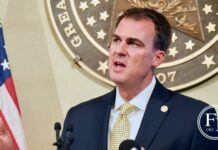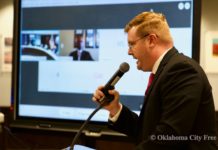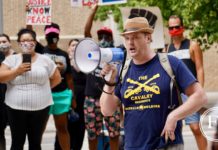Last Updated on January 5, 2024, 12:57 AM | Published: October 3, 2020
By Paula Sophia Schonauer, a licensed clinical social worker who was an Oklahoma City Police Officer for 22 years. Paula came out as transgender in November 2000.
Dear Chief Gourley,
To be honest, I was not happy when you were chosen to be the Chief of Police for the Oklahoma City Police Department. Your promotion told me our differences going back almost two decades had not been an impediment toward the advancement of your career, amounting to another invalidation of who I am as a person and who I was as a professional.
I think back to some of the hardest times of my life, and you were there either tangentially or directly involved in at least two critical incidents, both of which left me doubting my trust in fellow officers and devastated by inhumane treatment.
After undergoing a gender transition while employed as a police officer, I did not expect a warm reception of my emerging identity. However, I was told at the beginning of coming out that I would receive support and the opportunity to demonstrate my fitness for duty as a police officer.
Thankfully, these initial promises had been kept, and to my amazement, I was able to keep my job and continue to work in full capacity. However, there were a considerable number of officers who were not satisfied with that result, some of whom participated in trying to undermine my capacity to perform my job duties and others who tried to smear my character.
I endured three years of abuse (incidents ranging from daily micro-aggressions to outspoken belligerence in lineup, to lies told to the media, and to threats of physical harm in the form of “underground” newsletters) before I made a complaint.
I had hoped the initial impact of coming out as transgender would wear down with time, but it became obvious to me that some (including command) were not going to be content before driving me away from a profession I had loved and/or rendering my character damaged beyond repair.
I believe you were among those people. Your behavior toward me throughout my career, your obvious inability to hide your disdain, your consistent refusal to acknowledge the person I had become by misgendering me and displaying open hatred in front of other officers even as a member of command sent a message that harassment and hostility will be tolerated.
Although this letter is partially motivated by my own anger, it is also motivated by my desire to seek reconciliation, an apology, a gesture of goodwill that can provide the basis for restoring a broken relationship. Even as I write this, my own cynicism tells me my efforts are futile, but for the sake of my own wellbeing and for the sake of community trust, I hope this effort will bring a productive response.
Why do I think there is a possibility for this to happen?
It’s because I remember the officer you were twenty-eight years ago when you responded to a check-the-welfare call regarding an elderly gentleman who lived near NW 27th and Pennsylvania Avenue. I had been exposed to the harsh attitudes of police officers in my short few months on the department, and I was looking for people who had good hearts, officers who responded to human need with compassion.
On that day in November 1992, you bought this man something to eat with your own money, and you displayed a degree of compassion I had not yet witnessed among other police officers. I marked you as someone to follow, someone to emulate. Your goodwill seemed genuine and unselfconscious.
I remember this act of kindness because it gave me hope in a time when I was already beginning to doubt my ability to succeed in a career with so many people poisoned by cynicism.
I did not want to become someone with a tarnished view of humanity, someone with a broken heart from the deluge of inhumanity police officers witness every day. I did not want to become numb to the calling to be a protector of vulnerable people. I did not want to laugh at people who struggle with challenges and disadvantages most never encounter, and I did not want to lose my heart of service and the chance to make good in the world. Your gesture of goodwill that day kept me from resigning that evening.
So, I must ask, where is this person, today?
If that part of you still exists, I beseech you to regard my humanity and apologize.
We are long past the time when such an apology could be seen as an admission of liability, but we are very much within the time when such a humane gesture could go to great lengths toward healing emotional scars I have born for nearly two decades. And, perhaps, it may contribute to your own sense of decency and honor, qualities that mark the difference between adequate leaders and great leaders.
If you might scoff at the idea that I could be bearing emotional scars that go back so many years, I want you to consider what it is like to feel isolated within the police profession, to not be certain about backup, to not have confidence in the honesty and decency of your colleagues.
It cannot be a great leap of imagination because you have known people who have completed suicide when they felt they had lost face in front of their brother and sister officers. I am sure you have known the fear of not measuring up to your colleagues’ expectations, the fear of letting them down in a crucial moment, and I am sure you have felt the pressure to go along with the bad actions of a coworker because you did not want to be labeled as untrustworthy, singled out as a snitch.
That is the trauma I know, the trauma of being forced to report the bad behavior of fellow officers because to not do so would have ruined my self-esteem, rendered me powerless, and ashamed for lack of courage to stand up for myself. Upon doing so, I felt the world turn against me, became afraid for my survival, and doubted my ability to endure a life that had gone awry because I had broken a code of silence.
Feeling the disdain and hostility of fellow officers almost brought me to the point of despair, but I had faith that the voices of decent people might prevail, that someone would finally make a command decision that would stop the harassment and open displays of hostility.
It finally did happen but not before it took a toll upon my mental and physical health. To this day, I have difficulty trusting institutions and systems because I have seen how people operate within these systems, caring more about their own advancement, about fitting in, and about their own security rather than protecting and serving our communities.
I also developed some considerable physical problems from enduring years of locked knees and tense muscles, constant vigilance regarding my safety.
I know you know this feeling of heightened vigilance, but having to endure that vigilance around colleagues is especially hard because I had nowhere to relax.
My broken and replaced knees, my sore back, my tense shoulders and neck, and my weight gain are all emotional fallout from the years of abuse I endured. I take responsibility for overeating, but emotional eating is a response to significant stress, and I have yet to resolve some of these maladaptive means of coping.
That being stated, I am glad I did not vent my stress in other ways that would have placed me in the crosshairs of criminal liability. I have the sense that the police officers of the Oklahoma City Police Department would have gleefully arrested me, happily presented charges to the district attorney, laughed at my prosecution, and cheered at my conviction. It is not a stretch of imagination for me to think this. I have seen some of the things written about me in those underground newsletters, one of them stating that I should “get the gun back up to your head and do your fellow officers a favor.”
I raise awareness about what I endured because I do not want to see it happen to someone else. I also don’t want to see another incident like the death of George Floyd, watching as an officer stands by, a look of fear on his face, and doing nothing to stop a murder.
Some might say the fear on Officer Tou Thou’s face was a fear of the gathering crowd, but I know a different fear, the fear of standing out, of being different from one’s police officer colleagues, the fear of disturbing the silence.
I believe this fear is why some officers did not want to associate with me during the hardest days of my life. They did not want to be like me, hated and alone.
I await your response, Chief Gourley.
Sincerely,
Paula Sophia Schonauer, LCSW
Feature photo by Ryan Dlugash, Studio V2, https://www.flickr.com/photos/rblanding . Creative Commons license.
Guest Columnist Paula Sophia is a licensed clinical social worker in Oklahoma City and a former Oklahoma City Police Officer.











